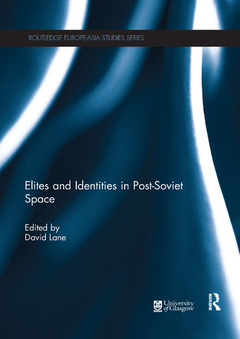Elites and Identities in Post-Soviet Space Routledge Europe-Asia Studies Series
Coordonnateur : Lane David

The dissolution of the communist system led to the creation of new states and the formation of new concepts of citizenship in the post-Soviet states of Central and Eastern Europe.
The formation of national identity also occurred in the context of the process of increasing economic and political globalisation, particularly the widening of the European Union to include the central European post-socialist and Baltic States. Internationally, Russia sought to establish a new identity either as a European or as a Eurasian society and had to accommodate the interests of a wider Russian Diaspora in the ?near abroad?.
This book addresses how domestic elites (regional, political and economic) influenced the formation of national identities and the ways in which citizenship has been defined. A second component considers the external dimensions: the ways in which foreign elites influenced either directly or indirectly the concept of identity and the interaction with internal elites. The essays consider the role of the European Union in attempting to form a European identity. Moreover, the growing internationalisation of economies (privatisation, monetary harmonisation, dependence on trade) also had effects on the kind of ?national identity? sought by the new nation states as well as the defining by them of ?the other?.
The collection focuses on the interrelations between social identity, state and citizenship formation, and the role of elites in defining the content of concepts in different post-communist societies.
This book was originally published as a special issue of Europe-Asia Studies.
1. Identity Formation and Elites in the Post-Socialist States, David Lane Part 1: Conceptualising Identities 2. European Identity Making and Identity Transfer, IreneuszPawel Karolewski 3. Russia’s Identity: Between the ‘Domestic’ and the ‘International’ Richard Sakwa 4. Neoliberalism, Exogenous Elites and the Transformation of Solidarity, Peter Zeniewski Part 2: Formation of Elites 5. The Elite-Population Gap in the Formation of Political Identities. A Cross-Cultural Investigation, Heinrich Best 6. Business Elites and the Role of Companies in Society: A Comparative Study of Poland, Hungary and Germany, Katharina Bluhm, Bernd Martens and Vera Trappmann 7. Supranational Attachment of European Elites and Citizens, Győrgy Lengyel Part 3: Country Studies 8. Balancing National Uncertainty and Foreign Orientation: Identity-Building and the Role of Political Parties in Post-Orange Ukraine, Inna Melnykovska, Rainer Schweickert, and Tetiana Kostiuchenko 9. Chechen Elites: Control, Cooption or Substitution? John Russell 10. Citizenship, Collective Identity and the International Impact on Integration Policy In Estonia, Latvia And Lithuania, Magdalena Solska 11. The Dynamics of Elite Networks and Patron-Client Relations in Afghanistan, Timor Sharan
David Lane is an Emeritus Fellow of Emmanuel College, Cambridge and was previously Professor of Sociology at the University of Birmingham. His recent work includes: Elites and Classes in the Transformation of State Socialism (2011); Rethinking the ‘Coloured' Revolutions (with Stephen White, 2010); The European Union and World Politics (with Andrew Gamble, 2009). Recent articles have been published in: The Political Quarterly (2008); Mir Rossii (2007); New Political Economy (2008); British Journal of Politics and International Relations (2009); European Societies (2010) and Communist Studies and Transition Politics (2011).
Date de parution : 05-2017
17.4x24.6 cm
Date de parution : 04-2012
Ouvrage de 192 p.
17.4x24.6 cm
Thèmes d’Elites and Identities in Post-Soviet Space :
Mots-clés :
Inventing National Identity; Citizenship and Post-Communism; Elites and Identity; Post-Communism; Elites and Identity Formation; New Member States of the European Union; Country's EU Membership; EU's Acquis Communautaire; EU Decision Maker; EU's Identity; EU's Quest; West Germany; Ramzan Kadyrov; Mass Political Identities; Supra-national Identities; Shock Therapy; ENP Country; Identity Transfer; European Attachment; OSCE High Commissioner; Civil Society; Foreign Orientation; Mass Identities; Nation Building; Russo Chechen War; EU Ukraine Association Agreement; National Tv Channel; EU's Transformative Power; Shock Therapy Reform; National Sameness; National Uncertainty
